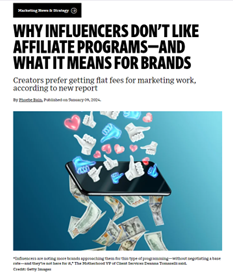The Motherhood’s new findings shed light on a growing debate between flat fees vs. influencer affiliate programs. Our team spoke to Ad Age to dive deeper into what we learned and the implications for brands and creators alike.
Influencer Affiliate Programs: Our POV
While the influencer affiliate programs have become a popular marketing tool for brands aiming to measure impact and cut costs, influencers seem less enthusiastic, with nearly 94% preferring flat-fee stipends, according to a survey by The Motherhood.
Ad Age shared that according to Deanna Tomaselli, The Motherhood’s VP of Client Services, influencers are encountering brands offering affiliate programs without negotiating a base rate, a situation they find unfavorable. Despite this, influencers often find themselves compelled to accept such deals, leading to a surge in the use of discount codes for tracking purposes.
The survey suggests that a hybrid compensation model, combining a base pay with commission, could be a more appealing option for influencers. Brittney Coburn, The Motherhood’s Executive VP of Operations, emphasizes that commission-based and flat-fee campaigns can coexist in a brand’s marketing mix. Offering a base pay alongside commission could increase influencer enthusiasm for brand collaborations.
Interestingly, only 17.2% of creators are willing to work on an “affiliate/commission-only basis” without a base fee, according to the survey. Nearly half of the respondents might consider foregoing a base fee depending on the commission rate offered.
In terms of minimum commission rates, 26.7% of influencers surveyed indicated an unwillingness to sign onto commission-only deals, regardless of the commission rate. Influencers express a preference for flat fees, citing the importance of brand awareness, even if a sale isn’t directly generated from their content.
Creator Dest Ramos highlights the value of flat fees, emphasizing that content contributes to brand awareness and guides consumers toward making a purchase. Coburn echoes this sentiment, stating that influencers want fair compensation for their time and effort, irrespective of sales outcomes.
The report underscores the relative youth of influencer marketing compared to other marketing elements. Influencers seek assurance that their creative efforts will be fairly compensated, even if content doesn’t immediately translate into sales or leads. Coburn identifies a disconnect in expectations between influencers and brands, citing a lack of understanding or education on both sides.
Part of the issue, according to Coburn, is the differing perspectives on influencer roles, with marketers sometimes viewing them as a bottom-of-funnel channel rather than a brand awareness method. To bridge this gap, Coburn suggests mapping influencer marketing to where it can have the most impact and aligning compensation models accordingly.
In conclusion, the report suggests that while influencer affiliate programs offer benefits for brands, creators are pushing for a fairer compensation model that recognizes the value of their content beyond immediate sales. A blend of flat fee and commission-based structures may be the key to a mutually beneficial influencer-brand partnership in the evolving landscape of digital marketing.



Take a Comment. Leave a Comment.
Read More ...
Influencer Marketing Resources: June 2025
Influencer Marketing Resources: May 2025
Influencer Marketing Resources: April 2025